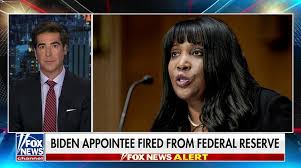
Introduction
Lisa DeNell Cook has become one of the most widely recognized American economists of her generation—an academic whose research on innovation, violence, and macroeconomic development crossed into the policy arena and culminated in historic service on the Board of Governors of the U.S. Federal Reserve. In 2022 she became the first Black woman ever to serve as a Fed governor; in 2023 she was reconfirmed to a full 14-year term running through January 31, 2038. Her career spans rigorous scholarship, institution-building for a more inclusive economics profession, and front-line macroeconomic policymaking through volatile, post-pandemic cycles.
This article traces Cook’s path from a childhood in Milledgeville, Georgia, through Spelman College, Oxford, and Berkeley; summarizes her most cited research; situates her priorities on the Fed Board; and examines debates that her work has sparked—along with significant news affecting her role.

Early Life and Education
Cook was born in 1964, one of three daughters of a hospital chaplain and a nursing professor. She grew up in Milledgeville during a period of desegregation; she has spoken publicly about the racially motivated violence she faced as a child integrating a formerly white school—an experience that later informed her scholarly interest in how violence shapes economic outcomes.
A standout student, Cook earned a B.A. in Physics and Philosophy (magna cum laude) from Spelman College in 1986, became Spelman’s first Marshall Scholar, and went on to Oxford (St Hilda’s College) for a second B.A. in Philosophy, Politics, and Economics (PPE) in 1988. She did graduate study in Senegal and then completed a Ph.D. in Economics at UC Berkeley, concentrating in macroeconomics and international economics.
Academic Career and Research Themes
Before joining the Fed, Cook built a wide-ranging academic portfolio—most prominently at Michigan State University, where she served as Professor of Economics and International Relations. Her scholarship frequently links macroeconomic performance with innovation, institutions, conflict, and finance, drawing on economic history, micro-data, and natural experiments.
Violence and Innovation
Cook’s most cited contribution investigates how racial violence and weak rule of law affected patent activity in the United States in the late 19th and early 20th centuries, especially among Black inventors. Using original datasets and historical episodes (riots, segregation statutes, lynchings) as shocks, she finds that heightened violence coincided with large, persistent declines in patenting, implying a sizable loss of inventive output and human capital formation. The work—shared in working paper form and later published—has influenced literatures on innovation, institutions, and growth.
Financial Systems, Development, and Macro Linkages
Beyond patents, Cook has researched topics such as financial development, crisis transmission, and barriers to entrepreneurship across countries. A through-line is how institutional quality—property rights, legal enforcement, financial intermediation—conditions the trajectory of productivity growth and technology diffusion.
Mentorship and Field-Building
Cook’s academic leadership includes sustained work to diversify the economics pipeline—through initiatives with the American Economic Association (e.g., the Summer Program) and collaborations that support Black women in economics and data science. These efforts predated and then paralleled her public-sector roles, amplifying her visibility as a mentor and institution-builder.

Policy Experience Before the Fed
Cook’s policy résumé—prior to becoming a governor—spans advisory and staff roles that connected research with macroeconomic management and international economics. She served in the Obama administration (Council of Economic Advisers staff) and advised on technology and innovation policy. Her engagement with multiple Federal Reserve Banks (as a visiting scholar/consultant) further integrated her academic and policy networks.
She also joined President-elect Biden’s transition team in 2020, a move widely noted for its representational significance and for the subject-matter expertise she brought on innovation and inclusive growth.
Historic Appointment to the Federal Reserve Board
On May 10, 2022, the U.S. Senate confirmed Cook to the Board of Governors by a 51–50 vote, with the Vice President casting the tie-breaker; she was sworn in May 23, 2022 to fill an unexpired term ending in 2024. In May 2023, the White House nominated her for a full term; she was reconfirmed September 6, 2023, and sworn in September 13, 2023, for a term expiring January 31, 2038. These milestones made her the first Black woman to serve—and then to be reconfirmed—for a full term on the Board.
Policy Focus as a Fed Governor
As a Federal Reserve governor, Cook participates in Board deliberations and votes on monetary policy as part of the Federal Open Market Committee (FOMC). Her public interventions—speeches and remarks—highlight three recurring themes:
- Financial Stability and the Transmission of Policy
Cook has underscored that a safe and sound banking system supports the Fed’s dual mandate. She links macroprudential vigilance and bank supervision with the efficacy of interest-rate policy and the resilience of credit intermediation. - Labor Markets and Inclusive Growth
Echoing strands of her academic work, Cook often emphasizes the long-run growth dividends of human capital, innovation, and broad labor-market participation—factors that shape potential output and the sustainable path for inflation. - Technology and Productivity—especially Artificial Intelligence
In July 2025, Cook devoted a speech to AI’s macroeconomic implications, noting that AI could reshape tasks and productivity, affecting both sides of the mandate—employment dynamics and inflation trajectories. She stressed the uncertainties: diffusion lags, reallocation frictions, and distributional effects that could show up in wage dynamics and price-setting. - Data-Dependence and Uncertainty Management
In June 2025 remarks on the outlook, Cook described the economy as on a “firm footing” but flagged elevated uncertainty and inflation still somewhat above target—language consistent with cautious, meeting-by-meeting calibration.

The Economic Context of Her Tenure
Cook’s service to date spans a challenging macro environment: disinflation from post-pandemic peaks; sectoral rotation in demand; rapid pass-through of rate hikes to interest-sensitive sectors; and ongoing debates about the neutral rate and productivity trends amid AI adoption. Her focus on financial stability and innovation-led growth positions her as a voice for balancing near-term price stability with long-run supply-side capacity.
Research Debates and Replication
Prominent work attracts scrutiny. In 2024, a reanalysis published in Econ Journal Watch examined Cook’s patents-and-violence results, probing data and identification choices. The replication debate illustrates healthy scientific contestation and underscores the challenge of measuring institutional shocks and innovative output in historical settings. Regardless of one’s view, the exchange has elevated interest in the mechanisms linking security, institutions, and innovation—a channel now central to economic development policy discourse.
Public Service, Representation, and Mentorship
Beyond her formal votes, Cook’s role has symbolic and pipeline effects. As the first Black woman on the Board, her presence and outreach have signaled opportunities for underrepresented scholars and practitioners across economics and finance. Her long involvement with student programs and groups (like the AEA Summer Program and collaborations spotlighted by outlets such as Teen Vogue) reflects a commitment to broadening participation in economic policymaking—a lever for legitimacy and better policy through heterogeneous perspectives.
Notable Speeches and Statements (Selected)
- Financial Stability (May 23, 2025). Emphasized that safeguarding the banking system and payments infrastructure reinforces the dual mandate, especially during tightening/loosening cycles.
- Artificial Intelligence and the Dual Mandate (July 17, 2025). Discussed how AI could reallocate tasks, alter productivity growth, and complicate real-time measurement of slack and inflation.
- Economic Outlook (June 3, 2025). Characterized the economy as resilient with inflation above target and rising uncertainty, implying a cautious, data-dependent stance.
Recent Developments (as of August 20, 2025)
On August 20, 2025, The Wall Street Journal reported that President Trump called for Governor Cook to resign after allegations surfaced—originating from Federal Housing Finance Agency head Bill Pulte—that she claimed two different properties as a primary residence within a two-week span in 2021 (Michigan and Atlanta). The report states Pulte said he would refer the matter to the Department of Justice; as of the report’s publication, the Federal Reserve had not commented. The article situates this in a broader context of White House pressure on the central bank and notes that Cook has tended to vote in line with Chair Jerome Powell on policy decisions. These allegations are unproven at this time; any legal or ethical findings would depend on formal investigations.
Context for readers: Such claims, if pursued, would move through standard investigative channels; until then, Cook remains a sitting governor with a term to 2038. As with any developing story, conclusions should rest on verified findings rather than early assertions.

Style of Policymaking
Observers often characterize Cook’s Fed interventions as empirically grounded and institution-minded:
- Evidence-first: Her academic background leads to careful parsing of micro-macro linkages, especially where supply-side dynamics (innovation, skills, infrastructure) shape inflation-adjusted growth.
- Inter-temporal balance: She voices the need to reduce inflation decisively while preserving the conditions for long-run productivity, entrepreneurship, and robust labor force participation.
- Institutional realism: From bank supervision to payments plumbing—and how those affect credit conditions—she tends to frame rate moves within a broader institutional matrix.
Influence on the Profession
Cook’s ascent has coincided with a broader conversation about who participates in economics. Her visibility has helped normalize the idea that top-tier economic policy can and should be informed by diverse life experiences and by research questions that consider institutional frictions—including violence and discrimination—as first-order economic determinants. The result is a profession incrementally more attentive to distributional consequences, barriers to entry, and innovation bottlenecks.
Selected Milestones and Dates
- 1964: Born in Milledgeville, Georgia.
- 1986: B.A. (Physics & Philosophy), Spelman College (magna cum laude).
- 1988: B.A. (PPE), Oxford (St Hilda’s), as Spelman’s first Marshall Scholar.
- 1990s–2010s: Academic posts culminating in Professor at Michigan State University.
- 2014: Journal of Economic Growth article on violence and patenting.
- May 10, 2022: Confirmed to the Fed Board (51–50). May 23, 2022: Sworn in; initial term through Jan 31, 2024.
- Sep 6, 2023: Reconfirmed for full term; Sep 13, 2023: Sworn in for term ending Jan 31, 2038.
- May–July 2025: Speeches on financial stability, economic outlook, and AI.
- Aug 20, 2025: Reported call from President Trump for her resignation amid allegations; investigations, if any, pending.

Why Lisa D. Cook Matters
- Intellectual Agenda: Cook’s work put innovation—and the social conditions enabling it—at the center of growth policy.
- Institutional Role: As a Fed governor, she has a durable seat in shaping U.S. monetary policy, supervision, and payments through 2038, absent resignation or removal.
- Representation: Her leadership broadens the set of problems economists consider and the range of talent drawn into the field.
- Public Debate: The scrutiny of her research and the politics around her appointment illustrate both the contested nature of modern policymaking and the importance of transparent, replicable analysis. econjwatch.org
Further Reading (Primary Sources)
- Federal Reserve Press Releases and Biography (appointments, oath, term dates, speeches).
- “Violence and Economic Activity: Evidence from African American Patents, 1870–1940.” Journal of Economic Growth (2014) and working paper versions.
- Official Fed History Profile (career summary and terms).
- Recent News on Allegations and Political Context (Aug 20, 2025).
Conclusion
Lisa D. Cook’s career bridges scholarship and statecraft. Her academic work argued—persuasively to many—that institutions and security are not peripheral to innovation and growth; they are foundational. As a Fed governor, she has channeled that perspective into a pragmatic focus on financial stability, data-driven policy, and technological change (including AI) as a potential supply-side tailwind tempered by real uncertainties.
At the same time, the policy spotlight brings intense scrutiny—of one’s research, record, and personal conduct. The August 2025 allegations underscore that high office is inseparable from public accountability. As of today, she remains a sitting governor with a term through 2038; any change will turn on facts established by proper processes. Either way, Cook’s imprint on the economics profession and her historic role at the Federal Reserve will remain a consequential chapter in the evolving story of American economic policy.


